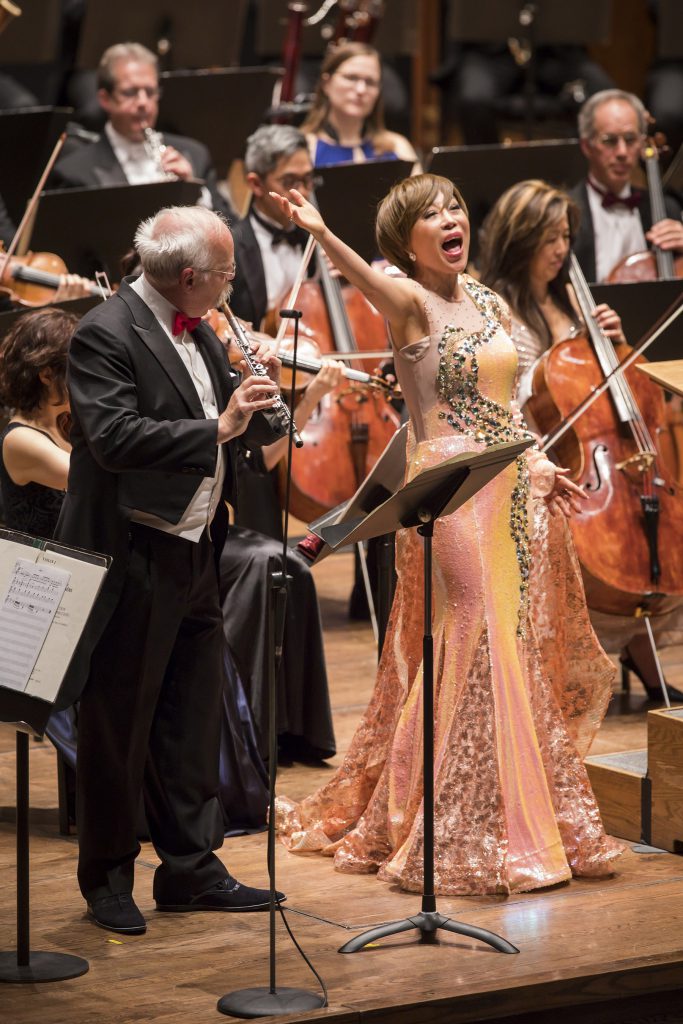Philharmonic offers a musical feast for Chinese New Year

Soprano Sumi Jo with principal flute Robert Langevin at the New York Philharmonic concert Tuesday night at David Geffen Hall. Photo: Chris Lee
For the sixth year running, the New York Philharmonic’s Annual Chinese New Year concert on Tuesday was among the orchestra’s most touted events of January. The 2017 edition felt a little lighter than last year’s installment, on the whole, but still offered an eclectic enough mix of Chinese folk and concert music with Western concert favorites to make for an entertaining program.
Tuesday’s concert began with a piece that has become a fixture at these annual celebrations, Li Huanzhi’s spirited Spring Festival Overture. This is a work that shines with pomp, a charming, lively fusion of Chinese tonality with Western concert sonority, and it was played and conducted with panache by Long Yu and the Philharmonic.
The concert offered a chance to hear concertmaster Frank Huang, now in his second year in that post, in a solo role, as he gave a stylish rendition of the Introduction and Rondo Capriccioso by Saint-Saëns. A staple of the violin show-rep, the piece is a showcase of technical ability and an opportunity for tremendous fun in the hands of a violinist who’s willing to ham it up. Huang was a brilliant showman, playfully brooding in the prologue and then keeping up that goofy flair for the duration, from the mock-vicious opening of the rondo right through to the whirlwind finish.
The marquee star of the evening, Korean soprano Sumi Jo certainly supplied celebrity glamour, bringing her beaming, supple soprano to a range of showy repertoire. She gave a bravura performance of the dizzying variations on “Ah! vous dirai-je, Maman” from Adolphe Adam’s Le Toréador, cutting through the daunting runs with clear, firm coloratura, while principal flutist Robert Langevin matched her with a virtuoso turn of his own. Less successful was Jo’s take on “Signore, ascolta!,” Liù’s first aria in Puccini’s Turandot, where her tendency to accent each note with a little hairpin smothered the line.
Jo’s most convincing work came in her trio of Chinese songs. The folk song “A little path” was earnestly realized, maintaining a simple, unassuming innocence even over an accompaniment that could have come from a Richard Rodgers love-song. Huang Zi’s “Three Rose Wishes,” meanwhile, proved strikingly Schumannesque, featuring a direct, pining, striving melody over cushioned strings. Li Qingzhu’s “I Live Beside the Yangtze River” offered vivid ripples from a harp, with delicate pulses in the orchestra. Jo handled all of these with sensitive artistry, in spite of some rather distracting diva gestures–such as rotating slowly, hand held high over the orchestra, as though in benediction.
Star power or no, the gem of Tuesday’s concert was the American premiere of Chen Qigang’s Joie Éternelle, a one-movement concerto for trumpet and orchestra, featuring Alison Balsom. Chen’s concerto begins with an introduction at once ominous and wistful, a deep rumble breaking over a soft haze. The trumpet initially feels lost, searching, grasping its way towards a theme. When it finally finds one–based on a traditional tune–the score calls for a mute, so that the more focused the melody becomes, the more distant it grows.
Chen creates vivid orchestral writing from modest material, using relatively simple effects to create colorful scenes. Bolsom’s reading soberly explored the piece’s emotional depths, constantly finding new meaning in the music’s folding repetitions.
What relationship Boléro bore to the rest of the program was a bit of a mystery, but then Ravel’s fifteen-minute crescendo always feels like a bit of a non sequitur, tacked onto the end of countless gala programs to lend a bit of extra pizzazz.
Even at its best, the rhythmic exploration rarely amounts to more than a neat trick, and the Philharmonic’s performance was far from ideal. The build was fitful, and ensemble frayed in spots, leaving the distinct impression that Boléro hadn’t received as much attention as the rest of the program. Why not end an unusual concert like this one with a flashy work by one of the Chinese composers already on the program? It would certainly be more apropos and likely a good deal fresher too.